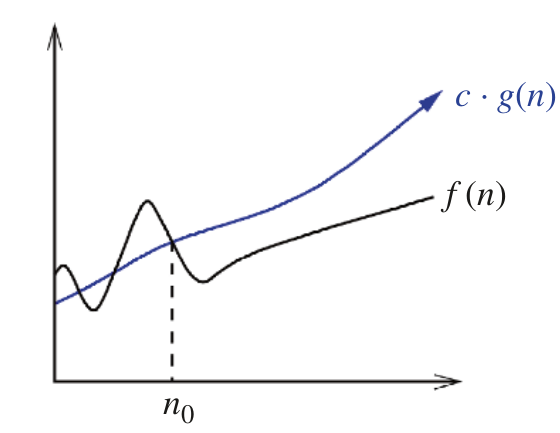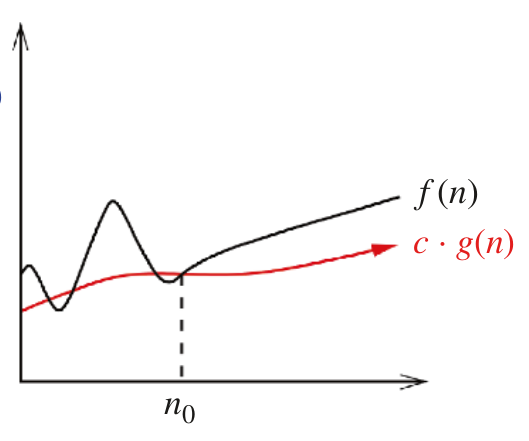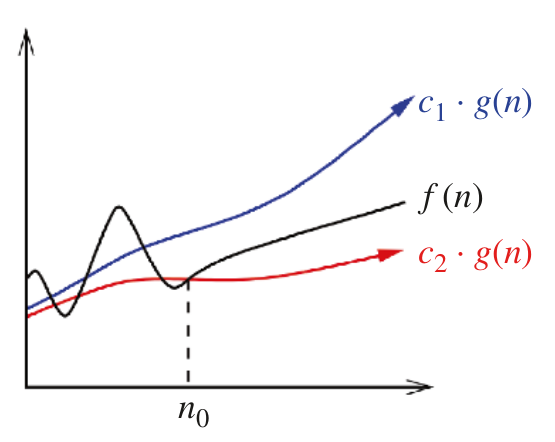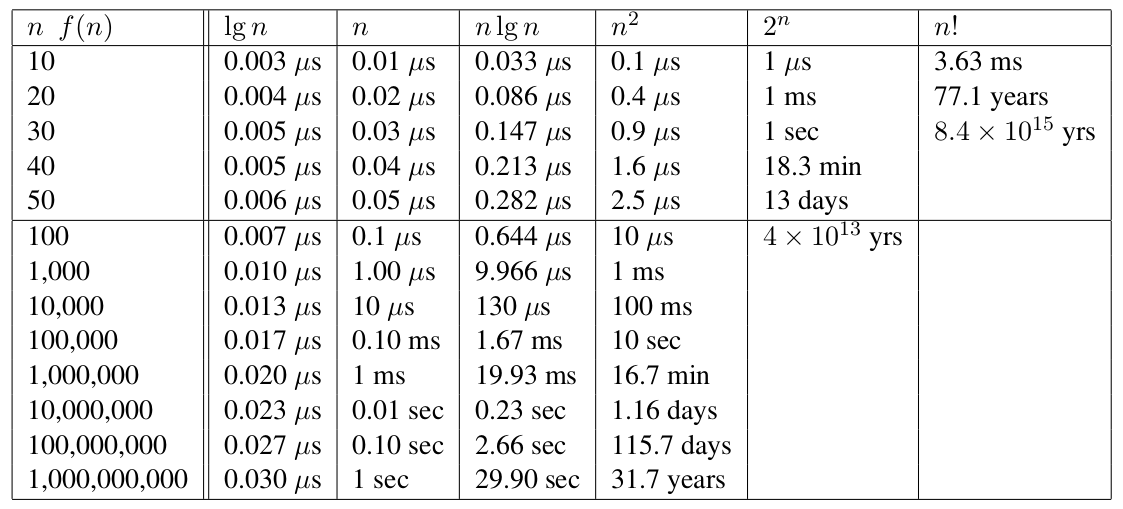# Asymptotic Notation, Continued --- CS 137 // 2021-09-08 <!--=====================================================================--> ## Administrivia - You should have turned in: + Your reflection for daily exercise 1 + Your solution to daily exercise 2 - <!-- .element: class="fragment"--> Returned assignment 1 on Gradescope + Decided **not** to assign seating, but please consider sitting in the same spot for the whole term <!----------------------------------> ## Administrivia - Textbook clarification: + **No textbook** is required for this course + We will be using the book provided for free by Cowles library <!--=====================================================================--> # Questions ## ...about anything? <!--=====================================================================--> # Big Oh Notation <!-- .slide: data-background="#004477" --> <!--=====================================================================--> ## $f(n) = O(g(n))$ $f$ is "big oh" of $g$ <div class="twocolumn" style="font-size: 85%"> <div> - **Informally:** + $g$ is an **upper bound** for $f$ - <!-- .element: class="fragment"--> **Formally:** + There is a constant $c>0$ such that $f(n) \le c\cdot g(n)$ for all $n\ge n_0$ </div> <div>  </div> </div> <!----------------------------------> ## $f(n) = \Omega(g(n))$ $f$ is "big omega" of $g$ <div class="twocolumn" style="font-size: 85%"> <div> - **Informally:** + $g$ is an **lower bound** for $f$ - <!-- .element: class="fragment"--> **Formally:** + There is a constant $c>0$ such that $f(n) \ge c\cdot g(n)$ for all $n\ge n_0$ </div> <div>  </div> </div> <!----------------------------------> ## $f(n) = \Theta(g(n))$ $f$ is "big theta" of $g$ <div class="twocolumn" style="font-size: 85%"> <div> - **Informally:** + $g$ is a **tight bound** for $f$ - <!-- .element: class="fragment"--> **Formally:** + There exist constants $c_1,c_2>0$ such that $c_1g(n) \ge f(n) \ge c_2g(n)$ for all $n\ge n_0$ - <!-- .element: class="fragment"--> **Alternatively:** + $f(n) = O(g(n)) = \Omega(g(n))$ </div> <div>  </div> </div> <!--=====================================================================--> # Daily Exercise <!--=====================================================================--> ## Big Oh Comparison - In practice, speeding up an algorithm by 2x is great even though $f(n)$ and $f(n)/2$ have the same asymptotic time complexity - <!-- .element: class="fragment"--> However, a jump from $n^2$ to $n\log n$ is a **CRAZY HUGE IMPROVEMENT** <!----------------------------------> ## Big Oh Comparison | $n$ || $n^2$ | $n^2/2$ | $n\log n$ |--------||---------|---------|----------- | $10$ || $100$ | $50$ | $33$ | $100$ || $10000$ | $5000$ | $664$ | $10^3$ || $10^6$ | $5\times 10^5$ | $9965$ | $10^4$ || $10^8$ | $5\times 10^7$ | $1.3\times 10^5$ | $10^5$ || $10^{10}$ | $5\times 10^9$ | $1.6\times 10^6$ <!--=====================================================================--> # Dominance Relations <!-- .slide: data-background="#004477" --> <!--=====================================================================--> ## Dominance Relations - When $f(n) = O(g(n))$ but $f(n) \ne \Theta(g(n))$, we say that $g$ **dominates** $f$ + <!-- .element: class="fragment"--> Sometimes written $f(n) \ll g(n)$ + <!-- .element: class="fragment"--> Sometimes written $f(n) = o(g(n))$ + <!-- .element: class="fragment"--> $f$ is "little oh" of $g$ <!--=====================================================================--> ## Another Characterization - With functions $f(n)$ and $g(n)$, consider the behavior of the limit: $$\lim_{n\rightarrow\infty}\frac{f(n)}{g(n)}$$ - <!-- .element: class="fragment"--> What if it diverges to $\infty$? - <!-- .element: class="fragment"--> What if it converges to $0$? - <!-- .element: class="fragment"--> What if it converges to a constant $c > 0$? <!----------------------------------> ## Another Characterization $$\begin{aligned} f(n) \gg g(n) &\iff \lim_{n\rightarrow\infty}\frac{f(n)}{g(n)}=\infty\\\\ f(n) \ll g(n) &\iff \lim_{n\rightarrow\infty}\frac{f(n)}{g(n)}=0\\\\ f(n) = \Theta(g(n)) &\iff \lim_{n\rightarrow\infty}\frac{f(n)}{g(n)}=c > 0 \end{aligned}$$ <!--=====================================================================--> ## Applications of Dominance  <!----------------------------------> ## Applications of Dominance - Exponential algorithms are hopelessly slow - <!-- .element: class="fragment"--> Quadratic algorithms get hopeless around $n=1000000$ - <!-- .element: class="fragment"--> $O(n\log n)$ algorithms get hopeless around $n=10^9$ - <!-- .element: class="fragment"--> $O(\log n)$ is extremely fast, even for extraordinary large values of $n$ <!--=====================================================================--> ## Exercises - Determine whether each of the following statements is true or false: + <!-- .element: class="fragment"--> $f(n) = O(g(n))$ is the same as $g(n) = \Omega(f(n))$ + <!-- .element: class="fragment"--> If $f(n) = O(g(n))$, then $f(n) = o(g(n))$<br>(i.e., $g$ *dominates* $f$) + <!-- .element: class="fragment"--> If $f(n) = o(g(n))$, then $f(n) = O(g(n))$ <!----------------------------------> ## Exercises - Consider the following algorithm ```java public int search(String[] arr, String val) { for (int i = 0; i < arr.length; i++) { if (arr[i] == val) { return i; } } return -1; } ``` - What is the **worst-case** runtime of `search`? <!----------------------------------> ## Exercises - Consider this algorithm where `arr` is sorted ```java public int search(double[] arr, double val) { int start = 0; int end = arr.length - 1; while (start <= end) { mid = (start + end) / 2; if (arr[mid] == val) { return mid; } else if (arr[mid] < val) { start = mid + 1; } else { end = mid - 1; } } return -1; } ``` - What is the **worst-case** runtime of `search`? <!----------------------------------> - Consider the following algorithm ```java public void foo(int[] arr) { for (int i = 0; i < arr.length; i++) { bar(arr, arr[i]); } baz(arr); } ``` - What is the **worst-case** runtime of `foo` given that: + `bar` is $O(1)$ and `baz` is $O(1)$ + <!-- .element: class="fragment"--> `bar` is $O(n)$ and `baz` is $O(1)$ + <!-- .element: class="fragment"--> `bar` is $O(1)$ and `baz` is $O(n)$ + <!-- .element: class="fragment"--> `bar` is $O(n)$ and `baz` is $O(2^n)$ <!--=====================================================================--> ## Reminders - Do a reflection for DE-2 - Do DE 3 before Monday